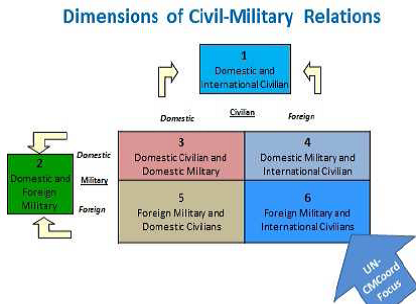Overview
Humanitarian operations may take place in areas affected by armed conflict. It is frequently justified and essential to interact and dialogue with military forces, in order to gain access to persons of concern and deliver vital humanitarian assistance.
In natural, technological and industrial disasters, governments may use national and external military forces to deliver relief (Haiti 2010, Philippines 2013). Particularly in complex emergencies (Pakistan 2005, 2010), coordination between military and humanitarian actors is vital, to ensure that humanitarian principles are fully understood, avoid competition, minimize inconsistency and, where appropriate, pursue common goals.
The United Nations Humanitarian Civil-Military Coordination (UN-CMCoord) exists to provide such coordination. UN-CMCoord promotes a broad understanding of humanitarian action, guides political and military actors on how best to support that action, helps develop context-specific policy based on internationally agreed guidelines, and establishes humanitarian civil-military coordination structures, ensuring that staff members are trained to make coordination work. It plays a particularly essential role in complex emergencies and high-risk environments, where it is vital to facilitate humanitarian access, protect civilians, and provide security for humanitarian workers.
Within the UN and humanitarian community, OCHA's Civil Military Coordination Service (CMCS) has responsibility for civil-military coordination. It supports relevant field and headquarter activities by developing institutional strategies to enhance the capacity and preparedness of national and international partners. By means of non-binding guidelines on use of military assets, and through training, workshops, conferences and simulation exercises, it improves the response of operational partners to humanitarian crises. As the custodian of UN-CMCoord guidelines, CMCS also helps humanitarian actors to develop context-specific guidance for operations in particular situations.
When necessary, CMCS advises the international community on mobilization of foreign military assets to support relief operations or humanitarian assistance. Its advocacy, coupled with the publication of operational guidance, complements and supports USG-level dialogue.
CMCS deploys experts known as Civil Military Coordination Officers to support the HCT/UNCT. Where they are not present, the Resident or Humanitarian Coordinator takes the lead, relying on UN-CMCoord doctrine. All UN personnel are expected to understand and follow UN-CMCoord polices and guidelines.
Main guidance
Underlying policies, principles and/or standards
- Preserve humanitarian space.
- Cooperation (or perceptions of cooperation) with the military must not jeopardize core humanitarian principles of neutrality and impartiality, or put persons of concern or humanitarian personnel at risk.
- Form and maintain appropriate relations between humanitarian and military or armed actors.
- Make appropriate and timely use of foreign or national military assets to support humanitarian operations.
- Ensure that relief efforts are consistent, whether they are delivered by civilian or military actors.
Good practice recommendations
- Planning. This varies according to the phase of an emergency. All those involved in the response need to share the same strategic overview, share information regularly, and understand clearly who is doing what, where and for how long.
- Information sharing. This works best when it is proactive. Information sharing helps to validate plans and adjust priorities and is critical to the safety and security of humanitarian workers and persons of concern.
- Task allocation. Clear attribution of roles ensures consistency and avoids duplication. It matches capacities to needs and supports forward planning by organizations on the ground.
Considerations for practical implementation
Map the actors
This will help you to identify the critical actors in the civilian and military communities, and decide which actors can most effectively operate and meet needs in given areas, in accordance with humanitarian principles. Military actors may help particularly to:
- Secure and maintain access to persons of concern.
- Support the security and logistical dimensions of an operation.
- Provide additional resources, especially in emergency operations.
- Make available their good offices to expedite assistance and resolve difficulties.
Assess and analyse civil-military relations, perceptions and approaches
Short-term cooperation can be effective, but long term implications must be considered, particularly where international military actors may be involved and where action to establish security on the ground might compromise (perceptions of) neutrality.
Determine missions and mandates
Consider the roles of:
- Domestic civilian actors: local leaders, NGOs, Government.
- Domestic military and paramilitary actors: military, police, gendarmerie, border and customs forces.
- International civilian actors: UN, INGOs, donors, ICRC.
- Foreign military actors: UN and non-UN peacekeeping forces, UN Civil Military Officers (CIMIC), military police, UNPOL.
Ascertain the mission or mandate of each of the actors identified, and understand their engagement in terms of UN-CMCoord.
Agree the character of civil-military relationships and set a CMCoord strategy
Basic strategies range from co-existence to cooperation. Coordination (essential dialogue and interaction) is always required, but its character should reflect the strategy.
Understand the strategy of the HC/RC and HCT/UNCT
When military and civilian actors clearly understand the HCT/UNCT's strategy, it helps the HCT/UNCT and the response to:
- Build shared situational awareness and understanding.
- Establish a common approach.
- Agree and implement a strategy.
- Facilitate implementation and monitoring.
- Share lessons learned.
Country specific UN-CMCoord guidelines should be developed for each operation, and persons with coordination responsibilities identified clearly.

Civil-military interaction may occur in six areas
Resources and partnerships
- OCHA Civil Military Coordination Officers.
- OCHA Civil Military Coordination Section.
- Consultative Group on Humanitarian Civil Military Coordination.
- UNHCR Field Security Advisors.
Annexes
Links
Main contacts
UNHCR Field Security Service (FSS), Division of Emergencies, Supply and Security (DESS).
In this section:
Let us know what you think of the new site and help us improve your user experience….
Let us know what you think of the new site and help us improve your user experience….
